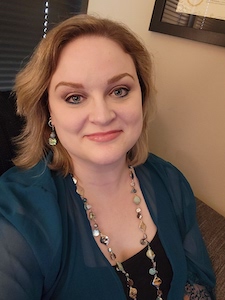The Perspective of a Mental Health Professional With MS
 We had the opportunity to speak with community member Wanda Komjathy, who is a mental health professional and is also living with relapsing-remitting multiple sclerosis (MS). Wanda specializes in chronic illness, anxiety, and depression. She is also certified in a form of therapy called Acceptance and Integration Training (more to come on what that is!). We found her perspective extremely interesting and are certain you will too!
We had the opportunity to speak with community member Wanda Komjathy, who is a mental health professional and is also living with relapsing-remitting multiple sclerosis (MS). Wanda specializes in chronic illness, anxiety, and depression. She is also certified in a form of therapy called Acceptance and Integration Training (more to come on what that is!). We found her perspective extremely interesting and are certain you will too!
Living with MS and helping others through therapy
How did your own MS journey and professional life intersect?
I noticed active symptoms at the end of 2016 (optic neuritis in the left eye, burning sensations in my fingers, and fatigue) and began the slow process of evaluation by medical specialists to figure out what was happening. In January 2019, I received my diagnosis of RRMS while I was halfway through my graduate program in Mental Health Counseling. Although I suspected I had MS and tried to prepare myself, to have it actually confirmed quickly became detrimental to my mental health.
I have, in the interim, developed trigeminal neuralgia on both sides of my face. After this development, I decided to seek therapy because I was NOT dropping out of school and letting this interfere with my goal of becoming a therapist. Then I, like every other person in the world, was thrust into a global pandemic, which brought with it the stress of divisive political ideologies as well as a collective downward spiral in mental health. What a challenging time to learn to therapize as I received what felt like a fatalistic diagnosis. Then my father passed away unexpectedly as well.
Despite all this, I graduated summa cum laude from my program in July of 2020. How could I possibly have done it amidst my and the world's tragedies? Therapy. I credit my therapist, as well as the hard work I have been doing with her guidance. It has not been an easy journey, but I feel and understand the difference within myself. It is the most incredibly rewarding thing I could have done.
I am currently in private practice, which has helped tremendously because I can make my own schedule. With the fatigue of MS, I do not function well in the early morning, so I see clients in the afternoon and early evening. I can provide more focused treatment, I can choose my clientele range, and if I am having an "MS day" (as I call it to my clients), there is no issue with me taking a day or 2 off to recover. My clients are also very understanding, and I am appreciative. Having created this flexible structure has actually led to fewer flare-ups, enabling me to be more present and available for my clients.
What are some typical challenges you hear from your chronically ill patients, and how do you help them cope?
The most consistent issue I have heard from my chronically ill clients is the feeling of being a burden to everyone, not just family or friends. The most prominent mental health challenges they face are feelings of loneliness, depression, anxiety, the need to withdraw/hide, and hopelessness. For those clients who are further along in the progress of their disease (for example, PPMS), I gently approach the idea of the end-of-life once I have built enough rapport for them to feel comfortable discussing it. While having something like PPMS does not guarantee an earlier passing, the odds are it is more likely. Usually, my clients have already thought about this but were reluctant to discuss it with family/friends who generally actively avoid the subject.
Giving them the opportunity to express how they feel, no matter how "dark,” is to experience freedom. I am certified in and utilize an approach called Acceptance and Integration Training (AAIT) in my practice. This relatively new style of therapy has been a game-changer for me in my own therapy, as well as my clients'.
Tell us more about Acceptance and Integration Training. What makes it different? Why do you think it works?
AAIT is a newer approach that focuses on uncloaking the true self while also resolving reactivity and psychological suffering. The truly noteworthy aspect of this emerging and promising approach is that works quickly and does not require you to re-experience the initial trauma or event. This is accomplished by discovering and facilitating the interpretation of psychological polarities (i.e., love/hate, good/bad). This integration neutralizes the psychological pain, restoring the client to a steady and often spacious inner state.
This makes it possible for them to access their OWN inner wisdom about a situation/event. I know it works because I am a living example of it. Having experienced it through my own therapy, I was inspired to learn more in order to provide similar benefits for my clients. In utilizing this therapy, I have also seen gratifying progress in my clients. AAIT is gentle in its approach, making the experience much less intimidating while still covering so much ground simultaneously.
How has becoming a mental health professional changed your perspective on your own diagnosis?
Being a therapist has helped to validate my own experiences and feelings around my illness through what my clients express about theirs. While I logically know I am not alone, having this disease can make me feel isolated at times. Through my own therapy, I have discovered I have been guilty of labeling aspects within my conditioned self and suppressing who I really am through my own psychological suffering. Imagine if you were defined only by your disease. Not gender, race, nationality, talent, or occupation.
While MS is unpredictable and inconvenient, and I have had to adjust my life around it, it no longer defines who I am as an individual. I enjoy helping guide my clients to their own realization. I know from my own personal experience I can provide hope and guidance to others. This is probably my most profound realization: I can and do understand on a deeper level the challenges associated with having a chronic illness, not just narrowed down to MS. I can provide more individualized care and develop a deeper client-therapist connection because of this “insider” insight.
What advice do you have for someone who might not be able to afford therapy sessions or is hesitant to start therapy?
For those who are struggling financially, most therapists are willing to work with you. We have income-based sliding scales, as well as some flexibility. We want to encourage you to seek help and we will do, within reason, what we can to ensure you receive assistance.
If you are hesitant to begin, there might be several reasons for this – previous unproductive therapy, expensive with little perceived gain, client/therapist incompatibility, or perhaps fear of examining one’s self too closely. Our primary responsibility is to ensure you feel comfortable freely disclosing your most personal, private concerns. While it might be initially intimidating, you will not be alone during the process. We meet you where you are currently and help guide you as you go through the more demanding parts of your journey to uncover your true self. The road to a more productive and peaceful life can indeed be yours.

Join the conversation